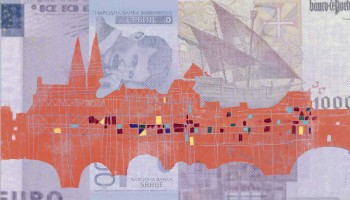In an interview published in Vijesti, Ratko Knežević, the former head of the Montenegrin Mission in Washington and advisor to Ðukanović, gave a detailed account of what he said was a tobacco smuggling operation that Ðukanović used to generate billions in profits for several years starting in the late ‘90s.
Knežević previously gave a statement to Italian prosecutors in Bari who indicted Ðukanović on organized crime and illegal tobacco trafficking chares.
The case against Ðukanović was dropped because of diplomatic immunity.
Knežević said he that learned that because of his cooperation with investigators his life is now in danger, and that he is “the next target of the tobacco cartel’s military wing.”
Knežević currently lives in London and holds dual British and Croatian citizenship. He also said that he has been warned by Croatian state security services of dangers he faces.
Knezevic Outlines “Operation”
According to Knežević, the tobacco smuggling was organized by a Montenegrin company under Ðukanović’s control called Montenegrin Tobacco Transit, or MTT. Through their representative in Milan, Duška Jeknić, the company sold exclusive licenses to mafia clans in Bari and Naples allowing them to illegally import cigarettes from Montenegro. “They, in turn, opened a specialized currency exchange office in Lugano, Switzerland, to launder the money made from this job,” said Knežević.
Ties to Subotić
Knežević also said the operation’s Serbian division was controlled by Stanko “Cane” Subotić, who was arrested in Moscow last April on an Interpol warrant for fraud. Although originally expected to be extradited to Serbia, Subotić was released two months later and is hiding. According to Knežević, Subotić was released because of his connections to Russian oligarch Oleg Deripaska.
Knežević cited an interview that Subotić gave with Vecernji List of Zagreb, in which Subotić says his “good friend” Ðukanović visited him several times while he was under house arrest in Moscow’s Ritz Carlton.
“The Military Wing”
Knežević described the tobacco cartel as having a military wing responsible for numerous murders over the last two decades, among them those of Vanja Bokan, killed in Athens and a former business partner of Subotić; and Radoslav “Badza” Sojičić and Jusuf Bulić, both killed in Belgrade, and Duško Jovanović, who was editor of the Podgorica daily Dan at the time of his death in May 2004.
The cartel’s latest victims, said Knežević, were Nacional owner and journalist Ivo Pukanić and his marketing director Niko Franjić.
Asked by the Vijesti interviewer why Pukanić was killed, Knežević said, “Subotić and Đukanović have long had a plan to rule the media and political space of the former Yugoslavia, for the sake of their business and illegal activities. That was the 'infernal plan' that Pukanić and his Nacional exposed, and because of which Pukanić and Franjić lost their lives.”
A spokesperson for Đukanović’s ruling DPS party has denied Knežević’s accusations.
---Michael Mehen





